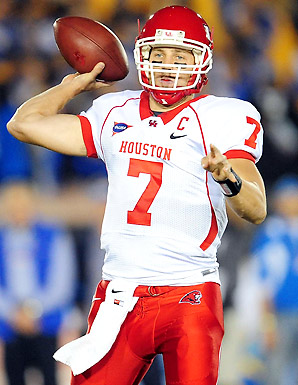Usual suspects not only teams capable of crashing BCS party
Respect has been earned; respect is due. How about we start calling them at-larges?
This year, the usual suspects are again vying for a spot in college football's VIP room. Two-time BCS participant Boise State begins the year ranked fifth in the AP poll and seventh in the Coaches'. Defending Rose Bowl champion TCU begins 14th and 15th, respectively. The Broncos and Horned Frogs may have head starts, but they're not the only contenders. Here's a look at the five non-AQ teams that could earn a BCS berth, in order of probability.
An offense that ranked second nationally last season will again have Heisman Trophy contender Kellen Moore at the helm, and the defense should be stout with Billy Winn and Shea McClellin up front. In all, the Broncos return 14 starters from a team that went 12-1 and was two missed field goals from potentially playing for the national title.
There are concerns, however. Boise must replace deep threats Titus Young and Austin Pettis, defensive leader Ryan Winterswyk and kicker/punter Kyle Brotzman, who took plenty of heat for his misses against Nevada but was largely a rock for the Broncos.
It won't take long to find out how badly Boise misses those departed players, as the Broncos put their BCS hopes on the line in Week 1 against Georgia in Atlanta. If the Broncos can survive what figures to be a much-improved Bulldogs squad, expect the BCS title-game talk to heat up again. The Broncos may not be tested again until their Nov. 12 meeting with TCU on the blue turf.
Defensively, these Horned Frogs have a chance to be as dominant as the units that ranked No. 1 nationally in five of the last 11 years. With star linebackers Tank Carder and Tanner Brock and budding star defensive end Stansly Maponga anchoring the unit, there shouldn't be many questions about this D.
The offense is another story. Quarterback Andy Dalton is gone. So too is receiver Jeremy Kerley, center Jake Kirkpatrick and five other starters. With those leaders gone, sophomore quarterback Casey Pachall will have to step up in a hurry and take pressure off Ed Wesley and the running game.
Pachall's ability to do so will likely determine whether TCU can crash the party one last time before joining the Big East next season. The Frogs face plenty of early tests with trips to Baylor, Air Force and SMU before taking on BYU at Cowboys Stadium. It may be difficult to get through October with a perfect record intact.
Few offenses will be more prolific. Case Keenum returns for a sixth season and will have at his disposal an All-America-caliber receiver in Patrick Edwards (1,100 yards and 13 TDs in 2010) and the deep tailback corps of Bryce Beall (870 yards), Michael Hayes (658) and Charles Sims (1,457 yards in '09, ineligible in '10).
It remains to be seen if the Cougars can field a defense on par with their offense. The unit ranked 103rd nationally in 2010, its third consecutive season ranking 100th or lower. Linebacker Sammy Brown ranked fifth nationally with 20 tackles for loss last season, and he'll anchor a group that should improve in its second year in a 3-4 scheme.
Houston avoids defending C-USA champ UCF and fellow contender Southern Miss, and the lone BCS conference opponent it will face, UCLA, won four games last year. An Oct. 8 date with East Carolina will be tough, but Houston's season and BCS aspirations will hinge on a three-game stretch that includes SMU, Tulane and likely the C-USA title game.
Few teams have been as consistent as the Golden Eagles, who have posted 17 consecutive winning seasons, the fourth-longest streak in FBS. However, they've failed to manage a 10-win season since Brett Favre's sophomore year in 1988.
So why put them on this list over division rival UCF? There's Larry Fedora's offense, which returns six starters including potential 1,000-yard rusher Kendrick Hardy and vastly underrated senior quarterback Austin Davis (he completed 62.9 percent of his passes last season for 3,103 yards and 20 touchdowns).
Then there's the schedule, which Phil Steele ranks 117th out of 120 in terms of difficulty. It includes one BCS conference school in Virginia (4-8 last season) and only one nonconference opponent that won more than five games in Navy (9-4). The Eagles get SMU and UCF in Hattiesburg and don't have to face Houston or Tulsa until a potential title game matchup.
The potential is there. But much like C-USA foe Houston, that won't matter unless a defense that allowed nearly 30 points per game last season can show improvement.
The schedule is daunting for the newly independent Cougars, but that's what makes them so intriguing.
BYU will face Ole Miss, Texas, Utah and UCF -- and that's just in the first four weeks. The Cougs also land Oregon State, TCU and Hawaii, making them the only non-AQ team with four BCS schools on their slate.
Their ability to navigate that gauntlet could depend largely on the development of quarterback Jake Heaps, who was up and down as a freshman starter but came into his own over the final five games of the season, passing for 1,259 yards and 13 touchdowns and leading the team to a bowl win over UTEP. Playing behind a line with 107 combined starts, Heaps is could be headed for a breakout season.
Surpassing last season's seven-win total shouldn't be a problem. But will the Cougars be resigned to playing in the Armed Forces Bowl, to which they're already committed? The talent is there, but the schedule may be too much.





